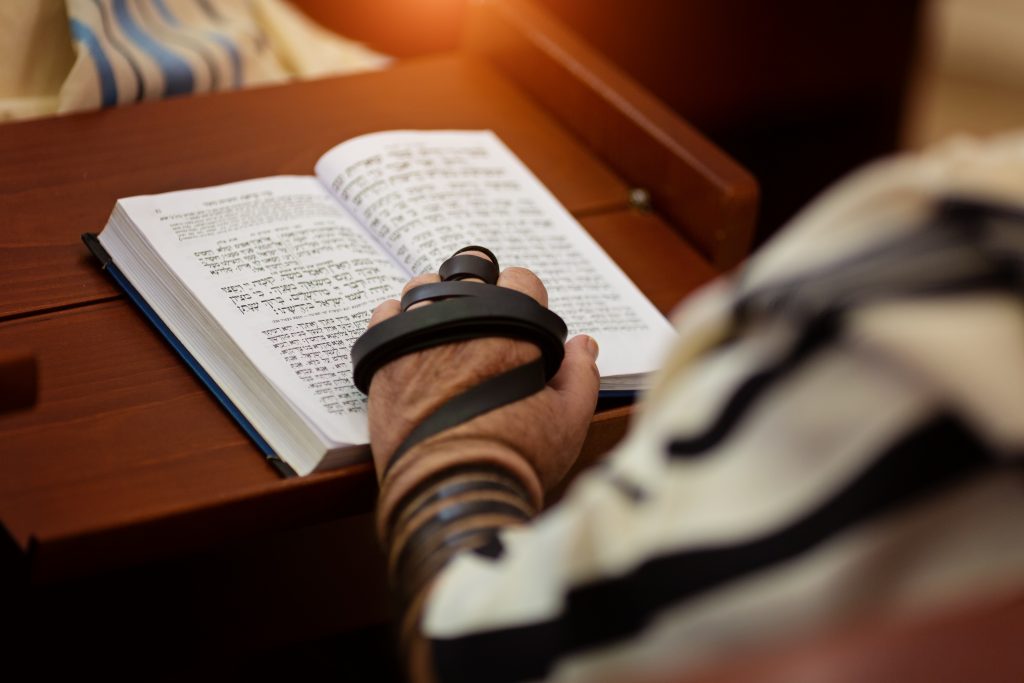The Shema Prayer
The most important prayer and declaration in the Jewish life is the “Shema Prayer”.
This declaration of faithfulness is a type of marriage vow if you will, as well as a hymn of praise to God. Below you can read the Shema in English. You can also read it in the book of Deuteronomy, as a part of a speech that Moses gave to the Israelites:
The Shema in English
“Hear (shema), O Israel: The Lord our God, the Lord is one.” (Deut. 6:4)
People often say that ‘seeing is believing’, but did you know the Bible teaches the opposite—that listening is more important than seeing? We can see it presented perfectly in the words of the Shema prayer.
The Hebrew Meaning of Shema
The prayer itself is named after the first word of this passage. Shema, in the simplest terms, means ‘to hear’. The Hebrew word pronunciation sounds more like “sh’-mah”. But it also means to obey and take action. So, to hear God is to obey God—and to obey God is to hear God.
Claiming the Inheritance with the Shema Prayer
The people were about to enter into the Promised Land. This context is key, because Moses’ speech sets the groundwork. It establishes a protocol for how the Israelites were to live and interact with each other and with God.
He won’t continue into the Promised Land with them, so he’s doing his part to set the people up for success. He says in verse 3: “so that it may go well with you and that you may increase greatly”. The words of the Shema likewise set us up for success.
These covenantal words weren’t issued solely for the Israelites for one moment of history; they are for all God’s children throughout all time.
Loyalty and Obedience
To begin, Moses specifically declares that there is one God and one God only. The Israelites have a significant history of being surrounded by people worshipping many different gods. From their early days in Canaan, through many years in Egypt, to the 40 years wandering the wilderness, they have been enclosed by polytheistic cultures.
It is made absolutely clear to the people that loyalty to, obedience of and love for their one true God is the only way from here on out. Divided allegiance could be a huge threat to Israel’s future, therefore Moses lays the foundation with this guiding truth.
Many translations of Deuteronomy 6:4 use “hear” for the word shema. However, the English understanding of “hear” doesn’t quite do this Hebrew word justice. Nor does it help us to internalize its meaning.
In Hebrew, the word “shema” means hearing but also the effect of it. Which is taking heed, being obedient, and moreover doing what is asked.
Shema Yisrael
Nevertheless, hearing is not just listening with one’s ears. It is also listening, heeding and obeying. Which elicits a response. It is a call to action, to listen AND obey. Not simply to hear and do nothing or listen and then forget – “in one ear and out the other.” Quite the opposite.
In Hebrew, “hearing” and “obeying” are essentially one in the same. Moses isn’t just telling the people, “hey, listen up!” (although it’s certainly part of it!). He’s saying, “live these words, embody them, fulfill with all your being and with all that you’ve got”.
James 1:22 perfectly echoes this sentiment by imploring us with these words:
“Don’t just listen to the Word of Truth and not respond to it, for that is the essence of self-deception. So always let his Word become like poetry written and fulfilled by your life!” (The Passion Translation)
We see this principle in action when Moses tells the people that they should “love the Lord your God with all your heart and with all your soul and with all your strength.” (Deut. 6:5)
Shema Prayer in the Synagogue
This is an encouragement to take action on the words which were just spoken. This is also the beginning of the V’ahavta (And you shall love) prayer, which is recited immediately after the Shema prayer in synagogue services.
“You shall love Adonai your God with all your heart, with all your soul, and with all your might.
Take to heart these instructions with which I charge you this day. Impress them upon your children.
“Recite them when you stay at home and when you are away, when you lie down and when you get up. Bind them as a sign on your hand and let them serve as a symbol on your forehead; Inscribe them on the doorposts of your house and on your gates.
“Thus, you shall remember to observe all My commandments and to be holy to your God.
I am Adonai, your God, who brought you out of the land of Egypt to be your God: I am Adonai your God.”
These words are based on the scripture Deuteronomy 6:4-9. After the challenge to listen, we also hear the command to obey and to act on the words spoken. We are encouraged to even make them tactile by reciting them and committing them to memory.

Surrounded by God’s Word
It is not uncommon for the Jewish people to display the words of the Lord in their dwelling places. Then, the Bible also says to “bind them upon our hands” and “establish them as a frontlet between our eyes.” While this concept is foreign to Christians, many Jews to pray in this manner.
Pious Jews are very committed to the Shema, and they hope that these Biblical verses are the last words they speak before they die. Jewish martyrs, including Holocaust victims, have uttered the Shema as their final confession of faith in the one true God and their devotion to Him.
Automatically, in our own prayer to the Lord, we can also call out the Shema. “Hear me oh Lord, take action to my cause!” Just like the speaker in Psalm 27:7 said, “Hear my voice when I call, Lord; be merciful to me and answer me.”
The same urgency with which Moses told the children of Israel to shema, the psalmist cries out to God. He asks Him to listen and take up his cause, to be merciful. What an encouragement as we continue to walk out our faith and lean on the Lord for our help!
Taking a Vow via the Shema Prayer
Moses wants the people to understand that their commitment to God is active and is demonstrated by how they choose to live. Just as a man and a woman, when exchanging their wedding vows, pledge the action encompassed in their words, so the speaker proclaiming the words of the Shema Israel Prayer.
The Shema has, in some ways, preserved Israel.
The words of commitment stood the test of time and today the Shema is still taken quite literally. Many Jewish people recite it daily as part of their morning and evening prayers. Most notably, Shabbat services in Israel and around the world recount the Shema weekly.
One of the first things Jewish parents teach their children is reciting the Shema.. It is a partial fulfillment of “teach them diligently to your children” (Deuteronomy 6:7).
The Power of Shema in Creation
In Genesis, God’s voice holds the power of creation (1:3). In 1 Kings, His voice is described as “a whisper” (19:12), while the Psalms explain that God’s voice strips the trees bare!Rabbi Jonathan Sacks wrote that listening for God was important because “the voice that brought the universe into being created us in love and guides us through our lives.”
Does that mean that all of creation shema – hears and obeys God’s voice? The answer is, to the best of our understanding, yes! “The voice of the LORD twists mighty oaks and strips the forests bare.” (Psalm 29:9) As creation hears God’s voice, it is automatically obedient.
God’s voice is able to “strip the forests bare”. Taking action in response to His powerful voice is essential in putting shema into practice. The hearing and responding are conjoined. If you want to hear from God today, you need to shema — hear AND obey.
Shema in the New Testament
Did you know that this concept from the Shema prayer continues into the New Testament? In fact, it was one of Jesus’ most fervent followers, apostle Paul, who wrote that our “faith comes from hearing” and not by what we see.
Perhaps that’s why the Bible describes God’s voice in such detail. So we know what to listen for. And through speaking and the voice of evangelism people hear the gospel. By hearing they are saved, if they so choose. (Romans 10:14)
Additionally, James, (Yaakov) the brother of Jesus teaches on this in his letter:
“But prove yourselves doers of the word, and not just hearers who deceive themselves. For if anyone is a hearer of the word and not a doer, he is like a man who looks at his natural face in a mirror; for once he has looked at himself and gone away, he has immediately forgotten what kind of person he was. But one who has looked intently at the perfect law, the law of freedom, and has continued in it, not having become a forgetful hearer but an active doer, this person will be blessed in what he does.” (James chapter 1:22-26, emphasis added)

Faith vs. Works?
James’ passage is often cited when discussing faith vs. works. Which I would argue is a Hellenized (Greek) way of understanding the passage. It is not faith versus works, but faith AND works.Without works, one’s faith, while legitimate, is not bearing the full fruit of one’s confession. And works without faith is empty, as the Scriptures also tell us and the Protestant reformers tried so hard to emphasize.
This is not saying that works prove one’s faith or are necessary to salvation (which would be against what the Scriptures teach us). But they are an indication of the state of our hearts and intentions.
Jesus said it perfectly himself:
“You will know them by their fruits. Do men gather grapes from thorn bushes or figs from thistles? Even so, every good tree bears good fruit, but a bad tree bears bad fruit. A good tree cannot bear bad fruit, nor can a bad tree bear good fruit.” (Matthew 7:16-18)
Shema – Instructions put into Practice
Another way to understand the Shema prayer it is this. We can read a manual for how to drive a car, or how to ride a bike. We can even have someone else read the manual out loud to us. But until we actually get behind the wheel and start driving…we won’t know how to drive.
In this way, James encourages the readers to walk out their faith. He encourages to walk out, heed and obey the Scriptures – to shema – to listen to them and obey.
Of course, we can’t do this in our own strength, and this is why we need the Holy Spirit to help us. We know that the Lord is compassionate and merciful with us, as we are human and fallible.
“For we do not have a high priest who cannot sympathize with our weaknesses, but One who has been tempted in all things just as we are, yet without sin. Therefore let’s approach the throne of grace with confidence, so that we may receive mercy and find grace for help at the time of our need.” (Hebrews 4:15)
This is a wonderful encouragement to us that through the Holy Spirit, we can grow into His likeness more and more each day. As we shema – listen, hear and obey the voice of the Lord in our lives.When you read the Bible, knowing some Hebrew words will always enhance your understanding.

7 Hebrew Words Every Christian Should Know: Free PDF Download
With the use of the Hebrew language God revealed Himself to mankind. This ancient tongue held the greatest spiritual truths that guided our lives through the ages. And in each generation, they are discovered anew.
We know the Bible can be hard to understand and you want to get more out of it. Which is why we want to teach you seven Hebrew words that will transform the way you read the Bible.
Articles Related to Shema
Estimated reading time: 10 minutes